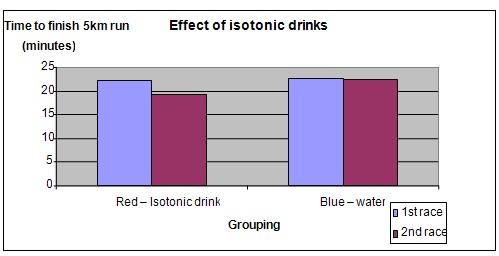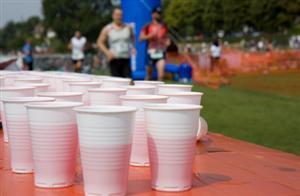| Complexity level: | 6 |
| Project cost ($): | 40 |
| Time required: | 1 hour to prepare, 2 weeks for science fair project |
| Material availability: | Easily found |
| Safety concerns: |
Hypothesis
Long distance runners will improve their performance by drinking isotonic drinks during runs.
Overview
Isotonic drinks and running
During exercise, a lot of the body’s water is lost through sweat. This causes dehydration. Our body needs to sweat in order to maintain a normal body temperature. But in the process, a lot of electrolytes are also lost through our sweat.
The body’s electrolytes such as magnesium, calcium, potassium and sodium help to conduct electric currents within our muscles that control muscular contractions. A shortage or imbalance in the levels of electrolytes in our bodies will cause fatigue, tiredness, sluggishness and a lack of energy.
Drinking water can help to rehydrate the body after moderate exercises. But strenuous exercise lasting more than 1 hour will require more than a replacement of the water that is lost through sweating. Electrolytes and carbohydrates lost during the exercise will also need to be replenished.
Isotonic drinks contain water, electrolytes and about 8% carbohydrates. Isotonic drinks are a convenient and quick way to help replace fluids and electrolytes that are lost through exercise and training, They also provide enough carbohydrates for an energy boost. Isotonic drinks are hence popular with middle-distance and long-distance runners, as well as team sports players (eg. football, soccer, hockey) as a quick means to replenish energy.
Scientific Terms
Materials
The materials required for this science fair project:
- 30 long-distance runners between ages 16 to 20
- A 5 km cross country path
- A stopwatch
- 15 bottles of Gatorade
- 45 bottles of water
- 15 blue T-shirts
- 15 red T-shirts
Procedure
1. For this science fair project, the independent variable is the consumption of an isotonic drink (i.e.Gatorade) at the watering point, during the second race. The dependent variable is the time taken by the runners to complete the 5 km run. The time taken to complete the 5 km run is recorded with a stopwatch. The constants (control variables) are the age of the participants and the distance of the cross country route.
2. On the first day of the experiment, the 30 athletes are made to run the 5 km cross country route. A watering station is placed midway along the route to supply the water bottles to the runners. The time taken by each of the athlete to complete the 5 km run is noted. The athletes are then divided into 2 groups of 15 persons each so that the average time of the runners in each group is almost the same. The average time is calculated by totaling the time taken by all the runners in the group and dividing by 15.
3. The second stage of the experiment is held 2 weeks later. All of the 30 athletes are required to run the same cross county route. The runners are separated into their groups. The first group is given the red T-shirts to wear. The second group is given the blue T-shirts to wear.
4. When the race is underway and the runners reach the watering station, the runners with the red T-shirts are given Gatorade, while the runners in the blue T-shirts are given bottles of water.
5. The time each athlete takes to complete the 5 km run is recorded. The new average time taken for each of the 2 groups is calculated and is recorded in the table given below.

Results
The results show that the runners in the first group wearing the red T-shirts were able to improve their time in the second race after drinking the isotonic drink (i.e.Gatorade). The runners in the 2nd group did not show much improvement in their average running time.
| Group | Precondition | Time to complete 5 km run (minutes) | % change | |
| 1st race | 2nd race | |||
| 1 | Red – Isotonic drink | 22.15 | 19.27 | -13.00% (faster) |
| 2 | Blue – water | 22.65 | 22.45 | -0.88% (faster) |
The graph below represents the results of our experiment:

Conclusion
The hypothesis that long-distance runners will improve their performance after drinking isotonic drinks is proven to be true.
Sports drinks should be taken after long hours of strenuous training, which lasts for more than 1 hour. Drinking sports drinks helps to replenish water, minerals and carbohydrates that are lost during the exercise. However, drinking too many isotonic drinks especially if you aren't exercising, will lead to other health problems, such as weight gain.
Also consider
This science fair project can also be repeated with other sports like swimming, cycling and triathlons.
This experiment can also be repeated using different brands of isotonic drinks (eg. Gatorate vs 100 Plus).
What about regular soda? Will consuming regular soda lead to similar results? What about coffee or other beverages that contain caffeine?
References
Sports drinks - http://www.atg.wa.gov/teenconsumer/health_and_safety/sports_drinks.htm
Running out of steam - http://www.alive.com/4545a12a2.php?subject_bread_cramb=956

